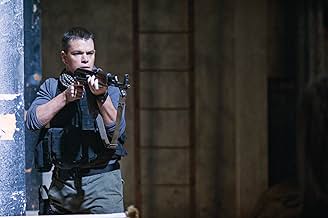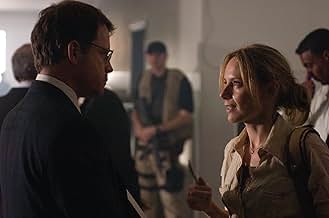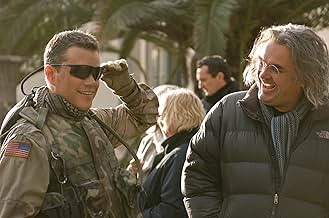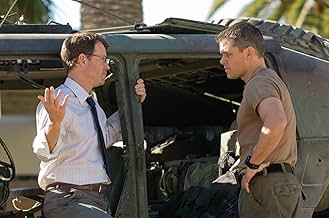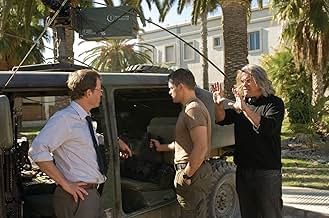Un oficial del ejército estadounidense asignado a buscar armas de destrucción masiva en una región inestable entra en territorio clandestino tras recibir información errónea.Un oficial del ejército estadounidense asignado a buscar armas de destrucción masiva en una región inestable entra en territorio clandestino tras recibir información errónea.Un oficial del ejército estadounidense asignado a buscar armas de destrucción masiva en una región inestable entra en territorio clandestino tras recibir información errónea.
- Dirección
- Guionistas
- Elenco
- Premios
- 6 nominaciones en total
Faycal Attougui
- Al Rawi Bodyguard
- (as Faical Attougui)
Michael J. Dwyer
- Met-D
- (as Michael Dwyer)
- Dirección
- Guionistas
- Todo el elenco y el equipo
- Producción, taquilla y más en IMDbPro
Opiniones destacadas
British director Paul Grengrass + American actor Matt Damon = "The Bourne Supremacy", "The Bourne Ultimatum" and now "Green Zone", so we know what to expect here - and we're not disappointed. From the opening seconds, we're into the action with the trademark Greengrass 'in the action' frenetic camera-work and sharp editing. Although the film is said to be inspired by the non-fiction book "Imperial Life In The Emerald City" by Rajiv Chandrasekaran, a journalist for The Washington Post, the conspiratorial storyline is the invention of Greengrass who developed the original script.
If the tension isn't as excruciating at that other Iraq movie "The Hurt Locker", at least "Green Zone" has a narrative and poses some questions, hard questions that many American viewers would probably were rather not aired: what was the source of the 'intelligence' that Saddam Hussein possessed weapons of mass destruction? why was the source so readily believed when the evidence was so thin? could the bloody insurgency which followed the relatively easy initial occupation have been avoided if the Americans had been willing to work with elements of the Iraqi army?
See the movie and think about the issues. As a central Iraqi character puts it: "It's not up to you to determine what happens in this country."
If the tension isn't as excruciating at that other Iraq movie "The Hurt Locker", at least "Green Zone" has a narrative and poses some questions, hard questions that many American viewers would probably were rather not aired: what was the source of the 'intelligence' that Saddam Hussein possessed weapons of mass destruction? why was the source so readily believed when the evidence was so thin? could the bloody insurgency which followed the relatively easy initial occupation have been avoided if the Americans had been willing to work with elements of the Iraqi army?
See the movie and think about the issues. As a central Iraqi character puts it: "It's not up to you to determine what happens in this country."
This movie is not a sequel to Bourne flicks. It is more in the spirit of Costa-Gravas or Oliver Stone. MET Alpha is Mobile Exploitation Team Alpha. The 85th XTF is the 75th Exploitation Task Force. CWO Miller is CWO Gonzalez. The reporter is, of course, Judith Miller, the New York Times (not WSJ) reporter who sold out to the Bush administration to get bylines. She used her position as shill for Rummy to keep MET Alpha in Baghdad, chasing their tails while American soldiers died trying to find non-existent WMD, for the sole purpose of backing up Bush's lies. Miller's folio is full of information from Curveball (Magellan). The CIA, who knew Curveball was a liar, was also warning Miller. A perpetually smiling Ahmad Chalabi keeps popping up. He is no doubt thinking how fine it is for the US Army to hand him an entire country along with a treasury of several hundred million dollars.
Miller is angry because he knows his intelligence is bogus, the CIA has told him that much, even though the Army vouches for it, and tells Miller to shut up and follow orders.
The Pentagon puke tries to bribe Miller with a job if he plays along, and offers a veiled threat if he doesn't.
The movie is history, and not a simple action adventure flick. It follows actual events very closely. Knowing the facts makes the movie much more fascinating.
Miller is angry because he knows his intelligence is bogus, the CIA has told him that much, even though the Army vouches for it, and tells Miller to shut up and follow orders.
The Pentagon puke tries to bribe Miller with a job if he plays along, and offers a veiled threat if he doesn't.
The movie is history, and not a simple action adventure flick. It follows actual events very closely. Knowing the facts makes the movie much more fascinating.
Green Zone is a movie about a soldier, leader of the team hunting for WMDs in Iraq, tries to step over the official army bullshit line and the red tape and actually achieve something. He gets a lucky break in finding a lead on general Al Rawi (the Jack of clubs in the famous Iraqi card deck) and stumbles upon a secret that explain not only why there are no WMDs, but also why (or better said how) the Americans came to enter the war.
As a movie it is a neat action film. A slightly less physical Bourne in Iraq, but with a political edge. It features shootings, helicopters, drama, conspiracies, evil suits, mislead Americans (represented, of course, by a journalist) lots of people speaking Arabic for no good reason other than they are Iraqi and lots of cramped alleyways.
There was a controversy about how the movie seems to reflect upon a real story. The real-life Roy Miller (actually Richard Gonzales, but shh, Miller sounds better), who also worked as a consultant for the movie, has issued a statement in which he clearly states the plot is a fantasy. I like how he ends the statement: "The real story of the hunt for WMD is, in fact, more interesting. Maybe one day, someone will want to tell that story.". A bit sad and a bit hopeful. Maybe History Channel will pick up on it in a few decades, when the heat is off ;)
Bottom line: well done action thriller, better than most, but then I like Matt Damon as an actor, so maybe I am biased. Certainly above average.
As a movie it is a neat action film. A slightly less physical Bourne in Iraq, but with a political edge. It features shootings, helicopters, drama, conspiracies, evil suits, mislead Americans (represented, of course, by a journalist) lots of people speaking Arabic for no good reason other than they are Iraqi and lots of cramped alleyways.
There was a controversy about how the movie seems to reflect upon a real story. The real-life Roy Miller (actually Richard Gonzales, but shh, Miller sounds better), who also worked as a consultant for the movie, has issued a statement in which he clearly states the plot is a fantasy. I like how he ends the statement: "The real story of the hunt for WMD is, in fact, more interesting. Maybe one day, someone will want to tell that story.". A bit sad and a bit hopeful. Maybe History Channel will pick up on it in a few decades, when the heat is off ;)
Bottom line: well done action thriller, better than most, but then I like Matt Damon as an actor, so maybe I am biased. Certainly above average.
Green Zone is a film that deafly navigates the possibly disastrous path of action saturation, creative liberties and touchy subject matter. Matt Damon's and director Paul Greengrass' third effort after The Bourne Supremacy and The Bourne Ultimatum tells the fictionalized but accurate account of the span following the opening siege of Iraq, where the supposed WMD program of Saddam Hussein failed to unveil itself. Green Zone will keep those looking for a sharp action-war film entertained and enrapture those interested in the politically charged events of the war without alienating either group.
This may not be the hard hitting expose for which some may be yearning, but it is all we could hope for in a mainstream Hollywood product. Greengrass is certainly no stranger to the events surrounding Iraq, having already helmed the highly touted United 93 which tells the story of one of the doomed planes on September 11th of 2001. His obvious passion for the subject gives Green Zone the gravitas and grounding a film like this needs and with the exception of multi-Oscar winner The Hurt Locker and Ridley Scott's Middle Eastern thriller Body of Lies this is the strongest of the growing glut of such movies.
Damon stars as Roy Miller, a chief warrant officer who is at the forefront for the search of WMD sites, all of which were gathered from a mysterious source known only as 'Magellan'. When site after site turns up empty, Miller begins to ask questions that high ranking officials do not want asked. With seemingly his only friend in all this, Marin Brown (Brendan Gleeson) a veteran CIA operative, and an Iraqi interpreter named Freddy, Miller goes rogue to uncover the truth. Standing in his way are the remaining loyal insurgents, a Whitehouse bureaucrat named Poundstone (Greg Kinnear) who wants to keep things on track and his asset on the ground who is tasked with stopping Miller's inquiries.
Matt Damon is extremely solid here. He has no weepy dramatic scenes or big blow-ups through which to act showy. He is very believable and low key and is an infinitely charismatic and commanding presence on screen. Kinnear is also quite good as the slimy suit that stands in the way of our hero and the lesser know supporting cast all drive home noteworthy performances as well. Much has been said about Greengrass' hand-held camera technique which seems to leave some on the nauseous side. I have however, come up with a theory in light of all the critics starting to get on my nerves and actually managing to turn my attention to the so called shaky cam, which has never before bothered me.
Take for example film critic James Berardinelli who seems to be on the line when it comes to that style of shooting. For the latter two Bourne films, he made ample criticism of the shaky cam and it would seem that his overall consensus reflected such. For Green Zone he claimed the vibration was far more restrained, which is in contrast to most other critics who claimed it was the worst yet. My theory? One's perception of the film is not due to the camera movement, but rather the inverse. Depending on how engrossed a person is with the material, performances etc that is how watchable they perceive the film to be. So in the case of Berardinelli, the camera movement was likely fairly similar, but he found Green Zone's material simply better.
Cinematography aside, Green Zone is a rousing action film with a spectacular climax. Not only will it keep you entertained on a Friday night, but it will serve as a reminder of what happened in Iraq every time you press play.
Read all my reviews at simonsaysmovies.blogspot.com
This may not be the hard hitting expose for which some may be yearning, but it is all we could hope for in a mainstream Hollywood product. Greengrass is certainly no stranger to the events surrounding Iraq, having already helmed the highly touted United 93 which tells the story of one of the doomed planes on September 11th of 2001. His obvious passion for the subject gives Green Zone the gravitas and grounding a film like this needs and with the exception of multi-Oscar winner The Hurt Locker and Ridley Scott's Middle Eastern thriller Body of Lies this is the strongest of the growing glut of such movies.
Damon stars as Roy Miller, a chief warrant officer who is at the forefront for the search of WMD sites, all of which were gathered from a mysterious source known only as 'Magellan'. When site after site turns up empty, Miller begins to ask questions that high ranking officials do not want asked. With seemingly his only friend in all this, Marin Brown (Brendan Gleeson) a veteran CIA operative, and an Iraqi interpreter named Freddy, Miller goes rogue to uncover the truth. Standing in his way are the remaining loyal insurgents, a Whitehouse bureaucrat named Poundstone (Greg Kinnear) who wants to keep things on track and his asset on the ground who is tasked with stopping Miller's inquiries.
Matt Damon is extremely solid here. He has no weepy dramatic scenes or big blow-ups through which to act showy. He is very believable and low key and is an infinitely charismatic and commanding presence on screen. Kinnear is also quite good as the slimy suit that stands in the way of our hero and the lesser know supporting cast all drive home noteworthy performances as well. Much has been said about Greengrass' hand-held camera technique which seems to leave some on the nauseous side. I have however, come up with a theory in light of all the critics starting to get on my nerves and actually managing to turn my attention to the so called shaky cam, which has never before bothered me.
Take for example film critic James Berardinelli who seems to be on the line when it comes to that style of shooting. For the latter two Bourne films, he made ample criticism of the shaky cam and it would seem that his overall consensus reflected such. For Green Zone he claimed the vibration was far more restrained, which is in contrast to most other critics who claimed it was the worst yet. My theory? One's perception of the film is not due to the camera movement, but rather the inverse. Depending on how engrossed a person is with the material, performances etc that is how watchable they perceive the film to be. So in the case of Berardinelli, the camera movement was likely fairly similar, but he found Green Zone's material simply better.
Cinematography aside, Green Zone is a rousing action film with a spectacular climax. Not only will it keep you entertained on a Friday night, but it will serve as a reminder of what happened in Iraq every time you press play.
Read all my reviews at simonsaysmovies.blogspot.com
The new offering from Paul Greengrass is an intriguing progression from his previous films. Marrying the political engagement of films such as 'Bloody Sunday' with the blockbuster attraction of the Bourne films, 'Green Zone' was always going to promise attractive viewing, and it doesn't disappoint.
Matt Damon's character, Chief Warrant Officer Roy Miller, is in charge of an American Armed Forces unit in search of Weapons of Mass Destruction during the early stages of the Iraq conflict. When their search proves fruitless, Miller begins to question the supposedly 'solid' intelligence that gave the locations of these WMD sites. The plot follows Miller's demand for answers from an unstable command desperate to hide them, revealing a political division at the heart of the U.S administration.
Yes, this is fiction, but Greengrass has become adept at tapping into our taste for conspiracy, contextualising his stories within a political reality that has become all too familiar to us since the invasion began in 2003. It's thrilling stuff, and I think that is the key word to remember when watching this film. Thriller. Yes, there is political content here, and yes, it does hold up to some scrutiny. For example, the opening of the movie portrays the sense of confusion of conflicting command structures particularly well, really getting into the disorientation and intrigue of a military operation that isn't going as planned. The role of journalist Laurie Dayne (played by Amy Ryan) also provides a well-executed analysis of how the media's coverage of the facts can be impaired by the manoeuvrings of political and military authority.
There are moments when this political engagement appears heavy-handed, but that is because the director's priority is always, first and foremost, entertainment. For example, there is nothing subtle about Damon's character walking into a scene of Americans drinking and lounging by the pool of one of Saddam Hussein's palaces. Furthermore, the film suffers from conventional Hollywood stereotypes when it tries to depict the 'downtrodden-yet-hopeful' Iraqi citizen, who works with Miller in order to expose the truth about his country. Khalid Abdalla (best known for his lead role in 'The Kite Runner') does his best with the material available, but the role lacks depth and complexity, and for me is one of the few disappointments of the film.
But, as I said, this a work of fiction, and there are plenty of moments where our taste for excitement and spectacle is satisfied. Greengrass' now familiar 'handycam' filming style is appropriate to the sense that we are never sure as an audience where the threat is going to come from. It provides a kick of adrenaline to the action sequences, making us feel the sand in our mouths as we are thrown to the floor, and adds docudrama realism to the events on screen. Some of the reviews I have seen complained about this style of cinematography, but I think Greengrass has managed to make the technique contribute to the content of his film, rather than becoming overly intrusive or threatening our cinematic experience.
There is a delicious feeling of melodrama to the piece as a whole – the moustached Jason Isaacs as the sinister Special Forces operative provides a gripping counterbalance to the inquiring Matt Damon. Brendan Gleeson is superb as the CIA agent that won't roll over and accept the demands of the military and political commanders. Indeed, the cast as a whole appears to work well together in a film that successfully marries the need for political engagement with the desire for cinematic spectacle. It is a film designed for box office appeal, and yet despite this it doesn't compromise on the political foundations on which it is based. Its climax is a fine reward for the audience's suspense – in short, a well-worked film that cuts to the heart of our craving for conspiracy and revelation.
James Gill (Twitter @jg8608)
Matt Damon's character, Chief Warrant Officer Roy Miller, is in charge of an American Armed Forces unit in search of Weapons of Mass Destruction during the early stages of the Iraq conflict. When their search proves fruitless, Miller begins to question the supposedly 'solid' intelligence that gave the locations of these WMD sites. The plot follows Miller's demand for answers from an unstable command desperate to hide them, revealing a political division at the heart of the U.S administration.
Yes, this is fiction, but Greengrass has become adept at tapping into our taste for conspiracy, contextualising his stories within a political reality that has become all too familiar to us since the invasion began in 2003. It's thrilling stuff, and I think that is the key word to remember when watching this film. Thriller. Yes, there is political content here, and yes, it does hold up to some scrutiny. For example, the opening of the movie portrays the sense of confusion of conflicting command structures particularly well, really getting into the disorientation and intrigue of a military operation that isn't going as planned. The role of journalist Laurie Dayne (played by Amy Ryan) also provides a well-executed analysis of how the media's coverage of the facts can be impaired by the manoeuvrings of political and military authority.
There are moments when this political engagement appears heavy-handed, but that is because the director's priority is always, first and foremost, entertainment. For example, there is nothing subtle about Damon's character walking into a scene of Americans drinking and lounging by the pool of one of Saddam Hussein's palaces. Furthermore, the film suffers from conventional Hollywood stereotypes when it tries to depict the 'downtrodden-yet-hopeful' Iraqi citizen, who works with Miller in order to expose the truth about his country. Khalid Abdalla (best known for his lead role in 'The Kite Runner') does his best with the material available, but the role lacks depth and complexity, and for me is one of the few disappointments of the film.
But, as I said, this a work of fiction, and there are plenty of moments where our taste for excitement and spectacle is satisfied. Greengrass' now familiar 'handycam' filming style is appropriate to the sense that we are never sure as an audience where the threat is going to come from. It provides a kick of adrenaline to the action sequences, making us feel the sand in our mouths as we are thrown to the floor, and adds docudrama realism to the events on screen. Some of the reviews I have seen complained about this style of cinematography, but I think Greengrass has managed to make the technique contribute to the content of his film, rather than becoming overly intrusive or threatening our cinematic experience.
There is a delicious feeling of melodrama to the piece as a whole – the moustached Jason Isaacs as the sinister Special Forces operative provides a gripping counterbalance to the inquiring Matt Damon. Brendan Gleeson is superb as the CIA agent that won't roll over and accept the demands of the military and political commanders. Indeed, the cast as a whole appears to work well together in a film that successfully marries the need for political engagement with the desire for cinematic spectacle. It is a film designed for box office appeal, and yet despite this it doesn't compromise on the political foundations on which it is based. Its climax is a fine reward for the audience's suspense – in short, a well-worked film that cuts to the heart of our craving for conspiracy and revelation.
James Gill (Twitter @jg8608)
¿Sabías que…?
- TriviaMany of the soldiers in Matt Damon's WMD unit were actual Iraq War and Afghanistan War veterans, not actors. Damon said his biggest challenge was knowing he was an actor who was giving orders to actual soldiers.
- ErroresLike most films situated in the Middle-East this movie was filmed in Morocco. The streets are filled with French cars that you would not find in Iraq and scenes of men in crowds wearing the Moroccan common dress.
- Bandas sonorasAboun Salehoun
Written by Youssef El Mejjad, Pat Jabbar
Performed by Amira Saqati
Courtesy of Barraka El Farnatshi Prod.
Selecciones populares
Inicia sesión para calificar y agrega a la lista de videos para obtener recomendaciones personalizadas
Detalles
- Fecha de lanzamiento
- Países de origen
- Sitios oficiales
- Idiomas
- También se conoce como
- Green Zone
- Locaciones de filmación
- Academia General del Aire, San Javier, Murcia, España(Iraq exteriors)
- Productoras
- Ver más créditos de la compañía en IMDbPro
Taquilla
- Presupuesto
- USD 100,000,000 (estimado)
- Total en EE. UU. y Canadá
- USD 35,053,660
- Fin de semana de estreno en EE. UU. y Canadá
- USD 14,309,295
- 14 mar 2010
- Total a nivel mundial
- USD 113,377,594
- Tiempo de ejecución1 hora 55 minutos
- Color
- Mezcla de sonido
- Relación de aspecto
- 2.35 : 1
Contribuir a esta página
Sugiere una edición o agrega el contenido que falta

Principales brechas de datos
What was the official certification given to La ciudad de las tormentas (2010) in Spain?
Responda







